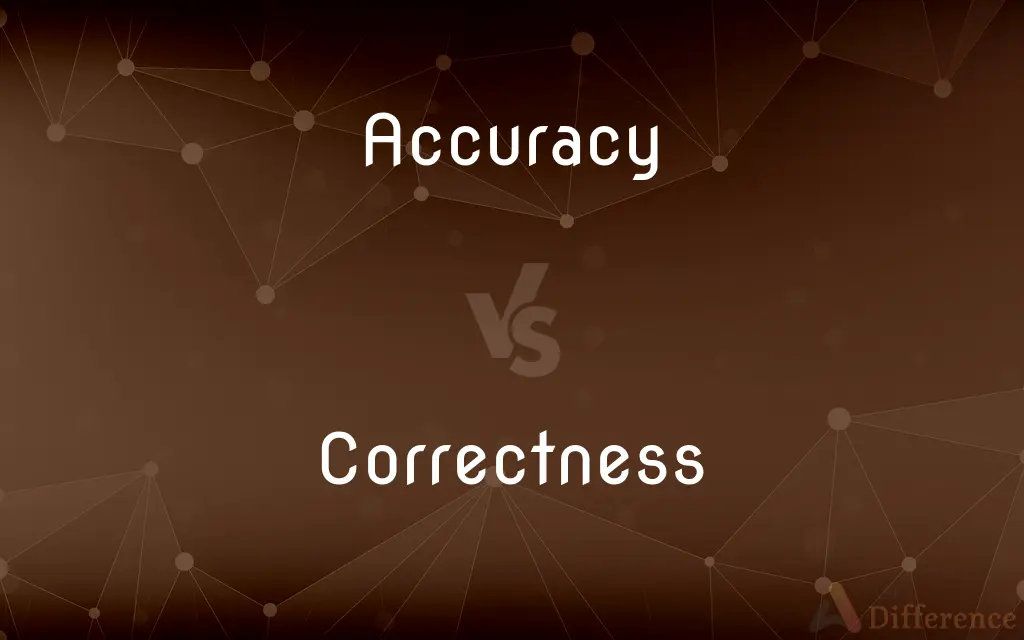Accuracy vs. Correctness — What's the Difference?
By Tayyaba Rehman & Maham Liaqat — Updated on March 27, 2024
Accuracy refers to the degree of conformity to truth or fact, while correctness is adherence to rules or standards.

Difference Between Accuracy and Correctness
Table of Contents
ADVERTISEMENT
Key Differences
Accuracy involves the precision and exactness in representing facts or details. It is often used in contexts where numerical, factual, or detailed precision is important, such as in measurements, statistics, or reported data. Accuracy indicates how close an outcome or description is to the true value or reality. Whereas, correctness refers to adherence to rules, conventions, or standards. It is about being right according to a specific set of rules or norms, which could be linguistic, legal, or procedural.
While accuracy is critical in fields like science, engineering, and research, where factual precision is paramount, correctness is often emphasized in language, law, and procedures, where adherence to accepted norms or regulations is required. For instance, a statement can be correct if it follows grammatical rules, but its accuracy is determined by its factual truthfulness.
Accuracy is quantifiable and can often be measured against an objective standard or true value, allowing for the calculation of errors or deviations. Correctness, on the other hand, is more binary and qualitative, typically judged against a set of criteria or standards without a gradation of how close or far something is from being correct.
In some contexts, something can be correct but not accurate. For example, a clock set to the wrong time zone may display the correct time for that zone but inaccurately for the local time. Conversely, a statement might accurately describe a situation but be grammatically incorrect.
Despite their differences, accuracy and correctness can overlap, especially in disciplines where precision and adherence to standards are both critical. For instance, in academic writing, presenting data accurately while also following the correct citation format is essential for both the reliability of information and the integrity of scholarship.
ADVERTISEMENT
Comparison Chart
Definition
Conformity to truth or fact; precision and exactness.
Adherence to rules, conventions, or standards.
Key Contexts
Science, engineering, research.
Language, law, procedures.
Measurement
Quantifiable, often with degrees of deviation.
Qualitative, binary (either correct or not).
Importance
Essential for factual precision and reliability.
Required for compliance with norms and standards.
Example
A measurement is accurate if it closely matches the actual value.
A sentence is correct if it follows grammatical rules.
Compare with Definitions
Accuracy
Can be measured and compared against true values.
The tool’s accuracy is within 0.01% of the actual measurement.
Correctness
Compliance with accepted rules or standards.
Ensuring the correctness of your work avoids procedural errors.
Accuracy
Relies on objective truth or fact for validation.
The historian's account was praised for its accuracy in detailing events.
Correctness
Judged as either correct or not, based on criteria.
Her use of the technique was correct, according to the manual.
Accuracy
Crucial in science and research for reliable data.
Ensuring the accuracy of the data is paramount for the study’s credibility.
Correctness
Adherence to rules or standards, often qualitative.
The document was revised to ensure its correctness in terms of format and citations.
Accuracy
Results that closely match factual or true conditions.
The GPS system’s accuracy is vital for navigation.
Correctness
Often relies on established conventions or norms.
The correctness of his argument was based on established legal precedents.
Accuracy
Conformity to truth or fact, with a focus on precision.
The accuracy of the experimental results was confirmed by multiple tests.
Correctness
Key in language and procedural contexts.
Legal documents require strict correctness to be enforceable.
Accuracy
The quality or state of being correct or precise
We have confidence in the accuracy of the statistics
Correctness
To make or put right
Correct a mistake.
Correct a misunderstanding.
Accuracy
Conformity to fact.
Correctness
To remove the errors or mistakes from
Corrected her previous testimony.
Accuracy
Precision; exactness.
Correctness
To indicate or mark the errors in
Correct an exam.
Accuracy
The ability of a measurement to match the actual value of the quantity being measured.
Correctness
To speak to or communicate with (someone) in order to point out a mistake or error.
Accuracy
The state of being accurate; being free from error; exactness; correctness
Correctness
To scold or punish so as to improve or reform.
Accuracy
Exact conformity to truth, or to a rule or model; degree of conformity of a measure to a true or standard value.
The jury doubted the accuracy of the witness' comments.
Correctness
To remedy or counteract (a defect, for example)
The new glasses corrected his blurry vision.
Accuracy
The state of being accurate; freedom from mistakes, this exemption arising from carefulness; exact conformity to truth, or to a rule or model; precision; exactness; nicety; correctness; as, the value of testimony depends on its accuracy.
The professed end [of logic] is to teach men to think, to judge, and to reason, with precision and accuracy.
The accuracy with which the piston fits the sides.
Correctness
To adjust so as to meet a required standard or condition
Correct the wheel alignment on a car.
Accuracy
The quality of nearness to the truth or the true value;
He was beginning to doubt the accuracy of his compass
The lawyer questioned the truth of my account
Correctness
To make corrections.
Accuracy
(mathematics) the number of significant figures given in a number;
The atomic clock enabled scientists to measure time with much greater accuracy
Correctness
To make adjustments; compensate
Correcting for the effects of air resistance.
Correctness
Free from error or fault; true or accurate.
Correctness
Conforming to standards; proper
Correct behavior.
Correctness
Freedom from error
Correctness
Conformity to the truth or to fact
Correctness
Conformity to recognized standards
Correctness
(computing) The state of an algorithm that correctly mirrors its specification.
Correctness
The state or quality of being correct; as, the correctness of opinions or of manners; correctness of taste; correctness in writing or speaking; the correctness of a text or copy.
Correctness
Conformity to fact or truth
Correctness
Conformity to social expectations
Common Curiosities
Is accuracy measurable?
Accuracy is often quantifiable, allowing for measurements against a true value or standard.
How is accuracy evaluated?
Accuracy is evaluated by comparing the outcome to an objective standard or true value, often involving the calculation of errors or deviations.
What ensures the correctness of a mathematical proof?
The correctness of a mathematical proof is ensured by its adherence to logical steps and established mathematical principles.
How does correctness differ from accuracy?
Correctness refers to adherence to rules, conventions, or standards, often without the quantifiable precision associated with accuracy.
Why might a procedure need to be correct?
A procedure needs to be correct to adhere to prescribed guidelines or standards, ensuring its validity and effectiveness.
What is accuracy?
Accuracy is the degree to which something conforms to truth or fact, emphasizing precision and exactness.
Can something be accurate but not correct?
Yes, something can be accurate (true to fact) but not correct if it does not adhere to specific rules or standards.
Why is correctness important?
Correctness is important for ensuring compliance with established norms, rules, or standards, which is crucial for effective communication and legal enforceability.
What role does correctness play in legal documents?
Correctness in legal documents ensures compliance with legal standards and conventions, which is necessary for their enforceability.
How do fields like science rely on accuracy?
In science, accuracy ensures that data, measurements, and reported facts closely match true values, which is essential for reliability and validity.
What happens if a research study lacks accuracy?
If a research study lacks accuracy, its findings may be unreliable or misleading, potentially invalidating the study.
Can a statement be correct but not accurate?
Yes, a statement can be grammatically correct but factually inaccurate if it does not truthfully represent the facts.
Can accuracy and correctness overlap?
Yes, in many contexts, accuracy and correctness can overlap, such as in academic writing, where both factual precision and adherence to stylistic standards are important.
How do conventions affect correctness?
Conventions define the standards or rules for correctness, meaning that adherence to these conventions determines whether something is considered correct.
How can accuracy impact decision-making?
Accurate information is crucial for informed decision-making, as it provides a reliable basis for choices and actions.
Share Your Discovery

Previous Comparison
Walrus vs. Cat
Next Comparison
Fascism vs. CommunismAuthor Spotlight
Written by
Tayyaba RehmanTayyaba Rehman is a distinguished writer, currently serving as a primary contributor to askdifference.com. As a researcher in semantics and etymology, Tayyaba's passion for the complexity of languages and their distinctions has found a perfect home on the platform. Tayyaba delves into the intricacies of language, distinguishing between commonly confused words and phrases, thereby providing clarity for readers worldwide.
Co-written by
Maham Liaqat













































